Reflective Journal: Analyzing Group Presentation Experience and Roles
VerifiedAdded on 2020/06/06
|6
|1141
|65
Journal and Reflective Writing
AI Summary
This reflective journal chronicles a student's experience with a group presentation, employing the Gibbs reflective cycle to analyze the process. The journal begins with a description of the group assignment and the student's role as an implementer, responsible for organizing and coordinating the team's efforts. The student reflects on their feelings about the role, highlighting both confidence and the challenges posed by uncooperative teammates. The evaluation section assesses the positive aspects, such as the development of interpersonal skills, and the negative aspects, such as the impact of team conflicts. The analysis delves into the importance of conflict management and the student's inability to effectively mediate disputes. The conclusion emphasizes the significance of team management and conflict resolution skills. Finally, an action plan outlines strategies for addressing similar situations in the future, including learning conflict management techniques and taking a proactive approach to resolve team issues. The journal provides valuable insights into teamwork dynamics, leadership challenges, and personal growth within a group project setting.
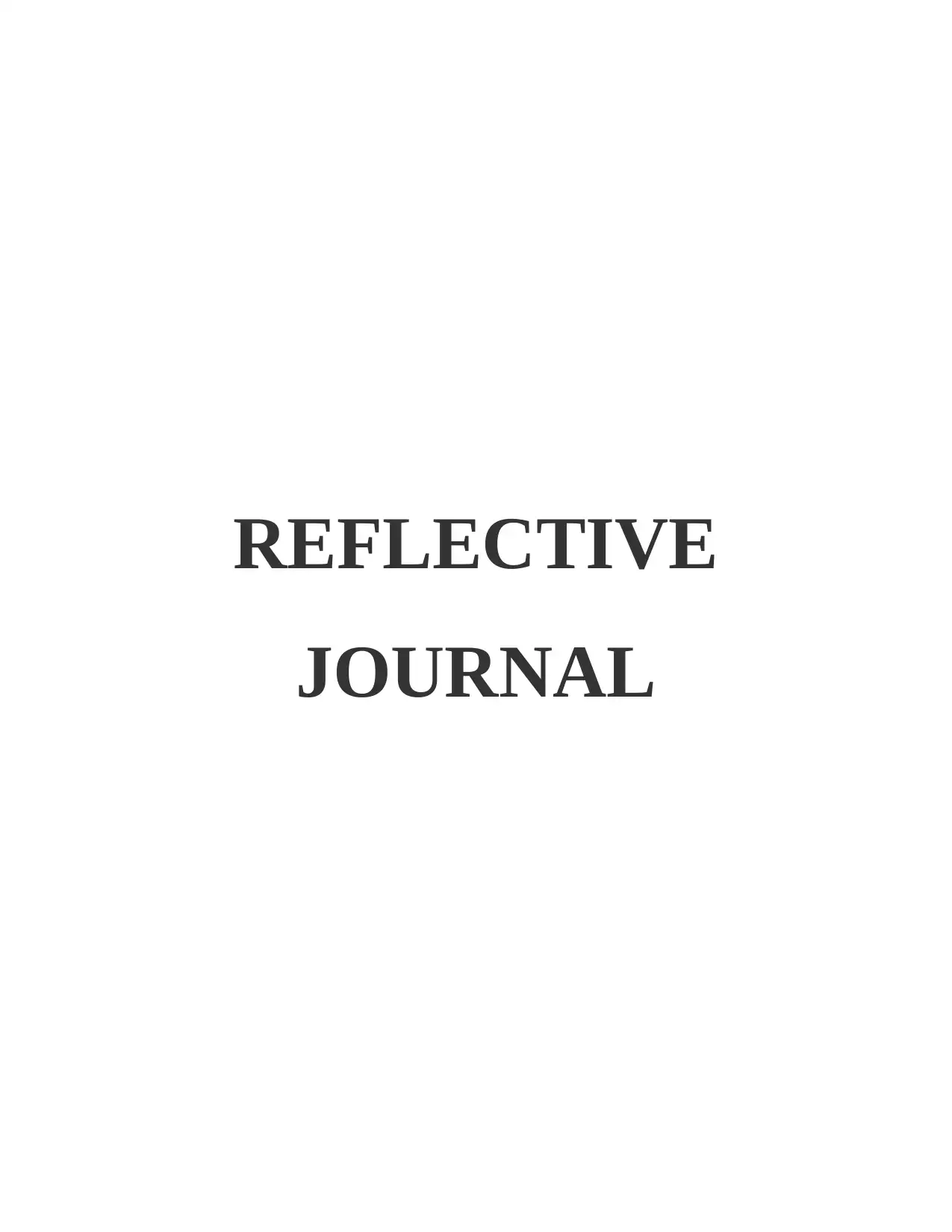
REFLECTIVE
JOURNAL
JOURNAL
Paraphrase This Document
Need a fresh take? Get an instant paraphrase of this document with our AI Paraphraser
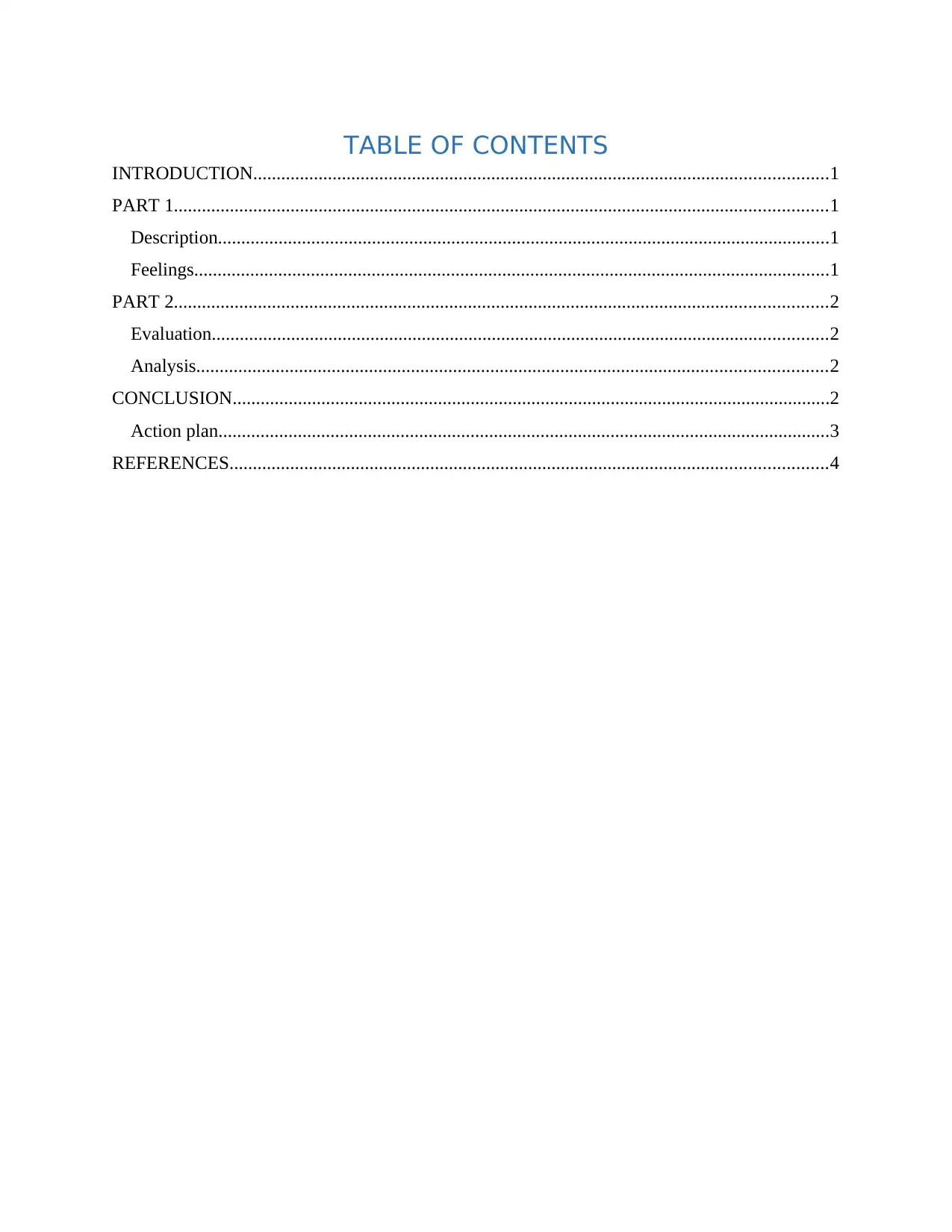
TABLE OF CONTENTS
INTRODUCTION...........................................................................................................................1
PART 1............................................................................................................................................1
Description...................................................................................................................................1
Feelings........................................................................................................................................1
PART 2............................................................................................................................................2
Evaluation....................................................................................................................................2
Analysis.......................................................................................................................................2
CONCLUSION................................................................................................................................2
Action plan...................................................................................................................................3
REFERENCES................................................................................................................................4
INTRODUCTION...........................................................................................................................1
PART 1............................................................................................................................................1
Description...................................................................................................................................1
Feelings........................................................................................................................................1
PART 2............................................................................................................................................2
Evaluation....................................................................................................................................2
Analysis.......................................................................................................................................2
CONCLUSION................................................................................................................................2
Action plan...................................................................................................................................3
REFERENCES................................................................................................................................4
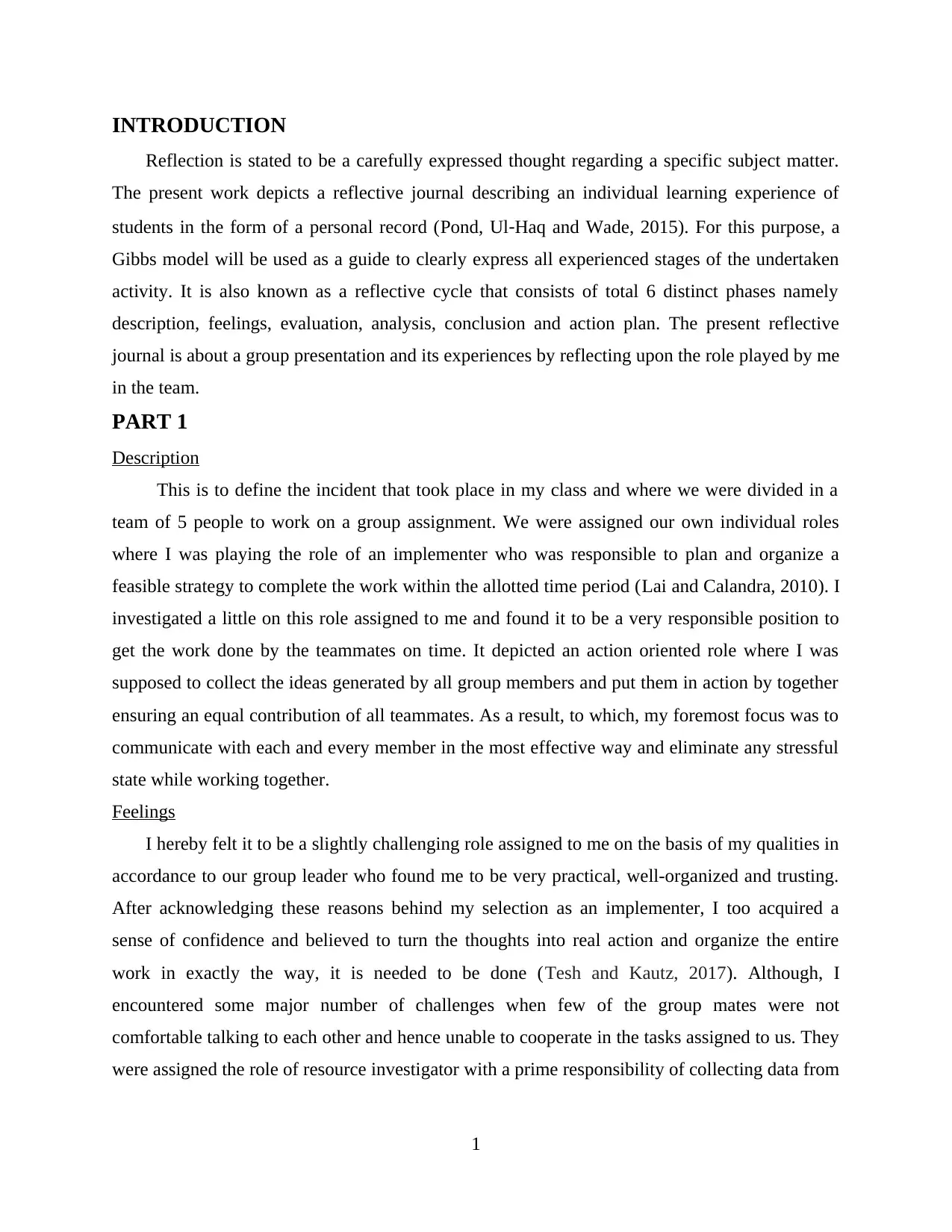
INTRODUCTION
Reflection is stated to be a carefully expressed thought regarding a specific subject matter.
The present work depicts a reflective journal describing an individual learning experience of
students in the form of a personal record (Pond, Ul‐Haq and Wade, 2015). For this purpose, a
Gibbs model will be used as a guide to clearly express all experienced stages of the undertaken
activity. It is also known as a reflective cycle that consists of total 6 distinct phases namely
description, feelings, evaluation, analysis, conclusion and action plan. The present reflective
journal is about a group presentation and its experiences by reflecting upon the role played by me
in the team.
PART 1
Description
This is to define the incident that took place in my class and where we were divided in a
team of 5 people to work on a group assignment. We were assigned our own individual roles
where I was playing the role of an implementer who was responsible to plan and organize a
feasible strategy to complete the work within the allotted time period (Lai and Calandra, 2010). I
investigated a little on this role assigned to me and found it to be a very responsible position to
get the work done by the teammates on time. It depicted an action oriented role where I was
supposed to collect the ideas generated by all group members and put them in action by together
ensuring an equal contribution of all teammates. As a result, to which, my foremost focus was to
communicate with each and every member in the most effective way and eliminate any stressful
state while working together.
Feelings
I hereby felt it to be a slightly challenging role assigned to me on the basis of my qualities in
accordance to our group leader who found me to be very practical, well-organized and trusting.
After acknowledging these reasons behind my selection as an implementer, I too acquired a
sense of confidence and believed to turn the thoughts into real action and organize the entire
work in exactly the way, it is needed to be done (Tesh and Kautz, 2017). Although, I
encountered some major number of challenges when few of the group mates were not
comfortable talking to each other and hence unable to cooperate in the tasks assigned to us. They
were assigned the role of resource investigator with a prime responsibility of collecting data from
1
Reflection is stated to be a carefully expressed thought regarding a specific subject matter.
The present work depicts a reflective journal describing an individual learning experience of
students in the form of a personal record (Pond, Ul‐Haq and Wade, 2015). For this purpose, a
Gibbs model will be used as a guide to clearly express all experienced stages of the undertaken
activity. It is also known as a reflective cycle that consists of total 6 distinct phases namely
description, feelings, evaluation, analysis, conclusion and action plan. The present reflective
journal is about a group presentation and its experiences by reflecting upon the role played by me
in the team.
PART 1
Description
This is to define the incident that took place in my class and where we were divided in a
team of 5 people to work on a group assignment. We were assigned our own individual roles
where I was playing the role of an implementer who was responsible to plan and organize a
feasible strategy to complete the work within the allotted time period (Lai and Calandra, 2010). I
investigated a little on this role assigned to me and found it to be a very responsible position to
get the work done by the teammates on time. It depicted an action oriented role where I was
supposed to collect the ideas generated by all group members and put them in action by together
ensuring an equal contribution of all teammates. As a result, to which, my foremost focus was to
communicate with each and every member in the most effective way and eliminate any stressful
state while working together.
Feelings
I hereby felt it to be a slightly challenging role assigned to me on the basis of my qualities in
accordance to our group leader who found me to be very practical, well-organized and trusting.
After acknowledging these reasons behind my selection as an implementer, I too acquired a
sense of confidence and believed to turn the thoughts into real action and organize the entire
work in exactly the way, it is needed to be done (Tesh and Kautz, 2017). Although, I
encountered some major number of challenges when few of the group mates were not
comfortable talking to each other and hence unable to cooperate in the tasks assigned to us. They
were assigned the role of resource investigator with a prime responsibility of collecting data from
1
⊘ This is a preview!⊘
Do you want full access?
Subscribe today to unlock all pages.

Trusted by 1+ million students worldwide
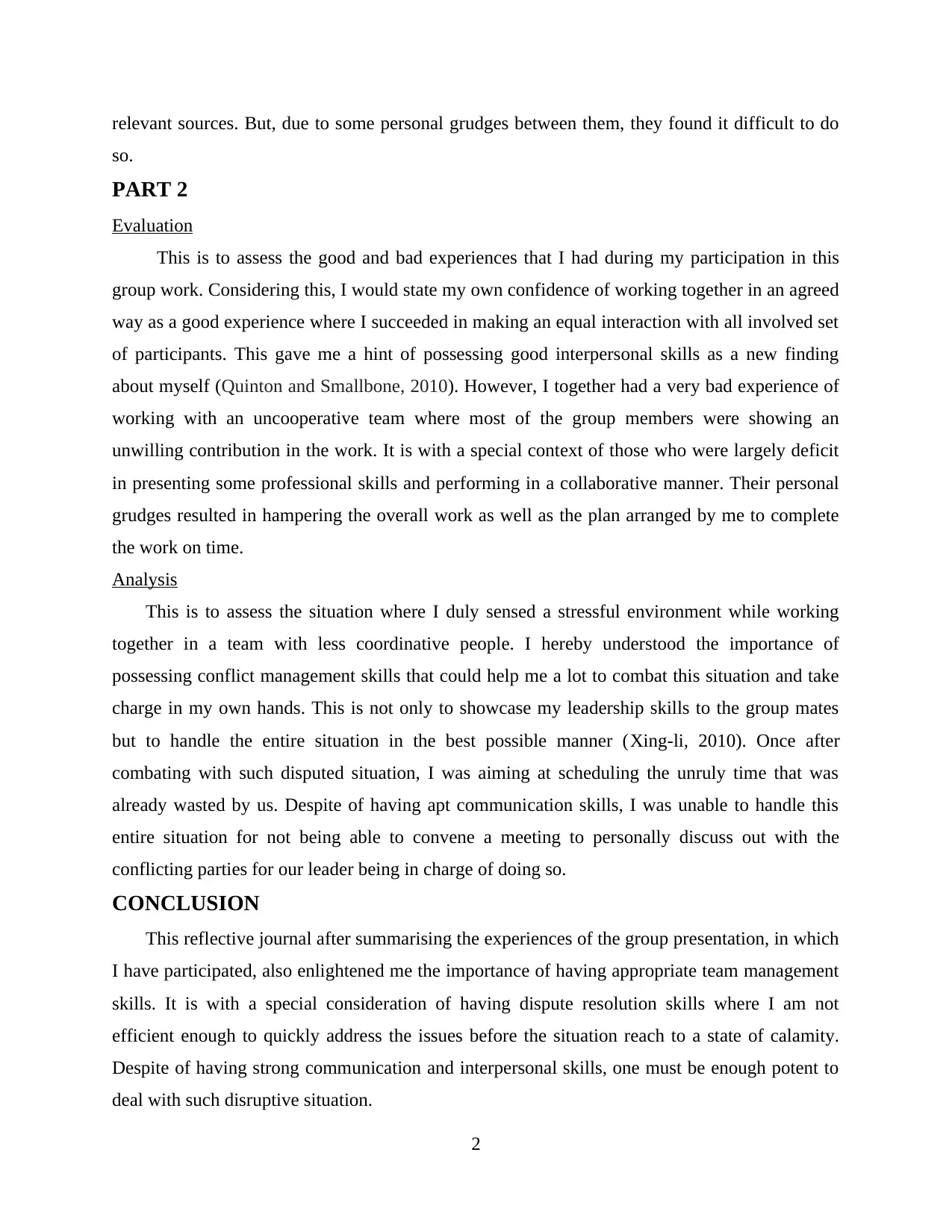
relevant sources. But, due to some personal grudges between them, they found it difficult to do
so.
PART 2
Evaluation
This is to assess the good and bad experiences that I had during my participation in this
group work. Considering this, I would state my own confidence of working together in an agreed
way as a good experience where I succeeded in making an equal interaction with all involved set
of participants. This gave me a hint of possessing good interpersonal skills as a new finding
about myself (Quinton and Smallbone, 2010). However, I together had a very bad experience of
working with an uncooperative team where most of the group members were showing an
unwilling contribution in the work. It is with a special context of those who were largely deficit
in presenting some professional skills and performing in a collaborative manner. Their personal
grudges resulted in hampering the overall work as well as the plan arranged by me to complete
the work on time.
Analysis
This is to assess the situation where I duly sensed a stressful environment while working
together in a team with less coordinative people. I hereby understood the importance of
possessing conflict management skills that could help me a lot to combat this situation and take
charge in my own hands. This is not only to showcase my leadership skills to the group mates
but to handle the entire situation in the best possible manner (Xing-li, 2010). Once after
combating with such disputed situation, I was aiming at scheduling the unruly time that was
already wasted by us. Despite of having apt communication skills, I was unable to handle this
entire situation for not being able to convene a meeting to personally discuss out with the
conflicting parties for our leader being in charge of doing so.
CONCLUSION
This reflective journal after summarising the experiences of the group presentation, in which
I have participated, also enlightened me the importance of having appropriate team management
skills. It is with a special consideration of having dispute resolution skills where I am not
efficient enough to quickly address the issues before the situation reach to a state of calamity.
Despite of having strong communication and interpersonal skills, one must be enough potent to
deal with such disruptive situation.
2
so.
PART 2
Evaluation
This is to assess the good and bad experiences that I had during my participation in this
group work. Considering this, I would state my own confidence of working together in an agreed
way as a good experience where I succeeded in making an equal interaction with all involved set
of participants. This gave me a hint of possessing good interpersonal skills as a new finding
about myself (Quinton and Smallbone, 2010). However, I together had a very bad experience of
working with an uncooperative team where most of the group members were showing an
unwilling contribution in the work. It is with a special context of those who were largely deficit
in presenting some professional skills and performing in a collaborative manner. Their personal
grudges resulted in hampering the overall work as well as the plan arranged by me to complete
the work on time.
Analysis
This is to assess the situation where I duly sensed a stressful environment while working
together in a team with less coordinative people. I hereby understood the importance of
possessing conflict management skills that could help me a lot to combat this situation and take
charge in my own hands. This is not only to showcase my leadership skills to the group mates
but to handle the entire situation in the best possible manner (Xing-li, 2010). Once after
combating with such disputed situation, I was aiming at scheduling the unruly time that was
already wasted by us. Despite of having apt communication skills, I was unable to handle this
entire situation for not being able to convene a meeting to personally discuss out with the
conflicting parties for our leader being in charge of doing so.
CONCLUSION
This reflective journal after summarising the experiences of the group presentation, in which
I have participated, also enlightened me the importance of having appropriate team management
skills. It is with a special consideration of having dispute resolution skills where I am not
efficient enough to quickly address the issues before the situation reach to a state of calamity.
Despite of having strong communication and interpersonal skills, one must be enough potent to
deal with such disruptive situation.
2
Paraphrase This Document
Need a fresh take? Get an instant paraphrase of this document with our AI Paraphraser
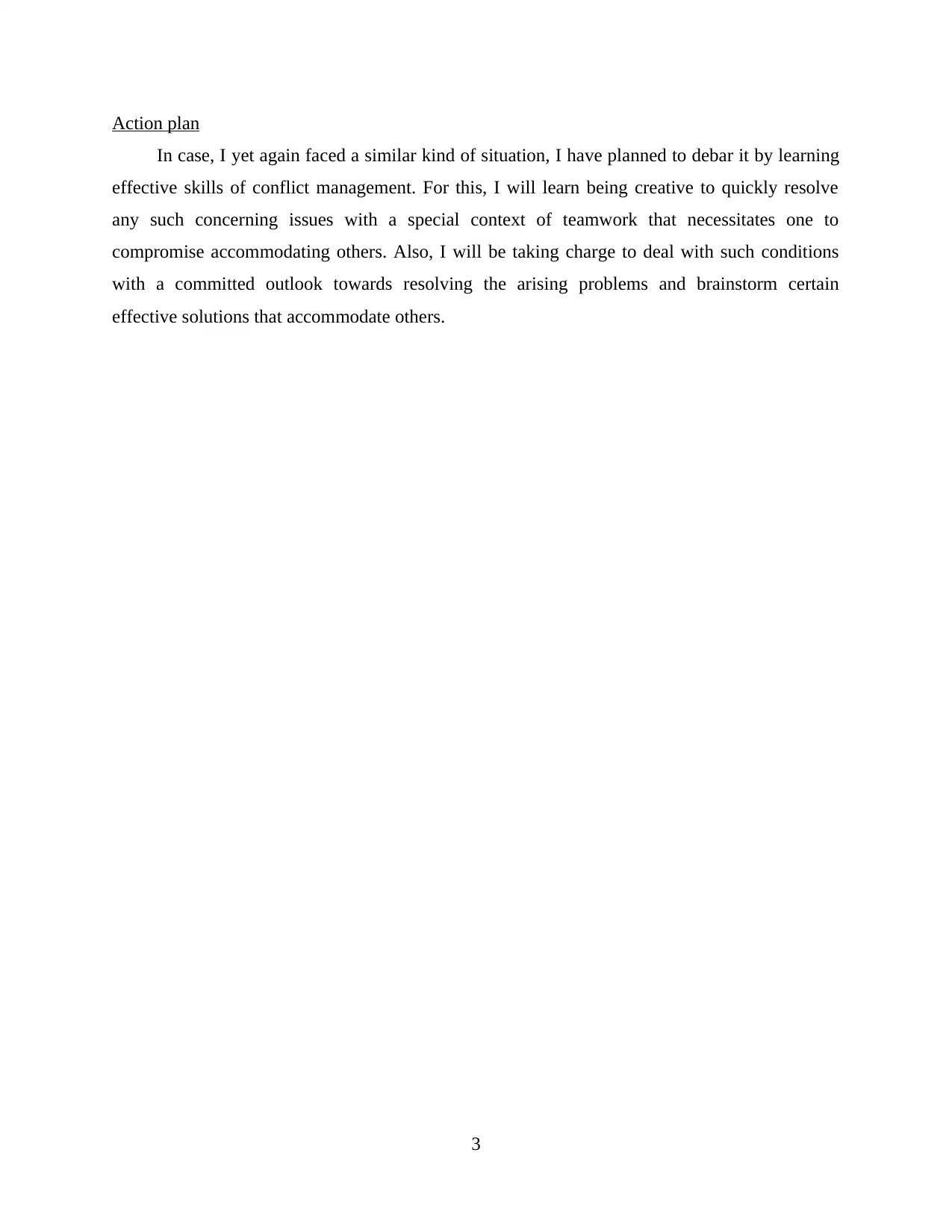
Action plan
In case, I yet again faced a similar kind of situation, I have planned to debar it by learning
effective skills of conflict management. For this, I will learn being creative to quickly resolve
any such concerning issues with a special context of teamwork that necessitates one to
compromise accommodating others. Also, I will be taking charge to deal with such conditions
with a committed outlook towards resolving the arising problems and brainstorm certain
effective solutions that accommodate others.
3
In case, I yet again faced a similar kind of situation, I have planned to debar it by learning
effective skills of conflict management. For this, I will learn being creative to quickly resolve
any such concerning issues with a special context of teamwork that necessitates one to
compromise accommodating others. Also, I will be taking charge to deal with such conditions
with a committed outlook towards resolving the arising problems and brainstorm certain
effective solutions that accommodate others.
3
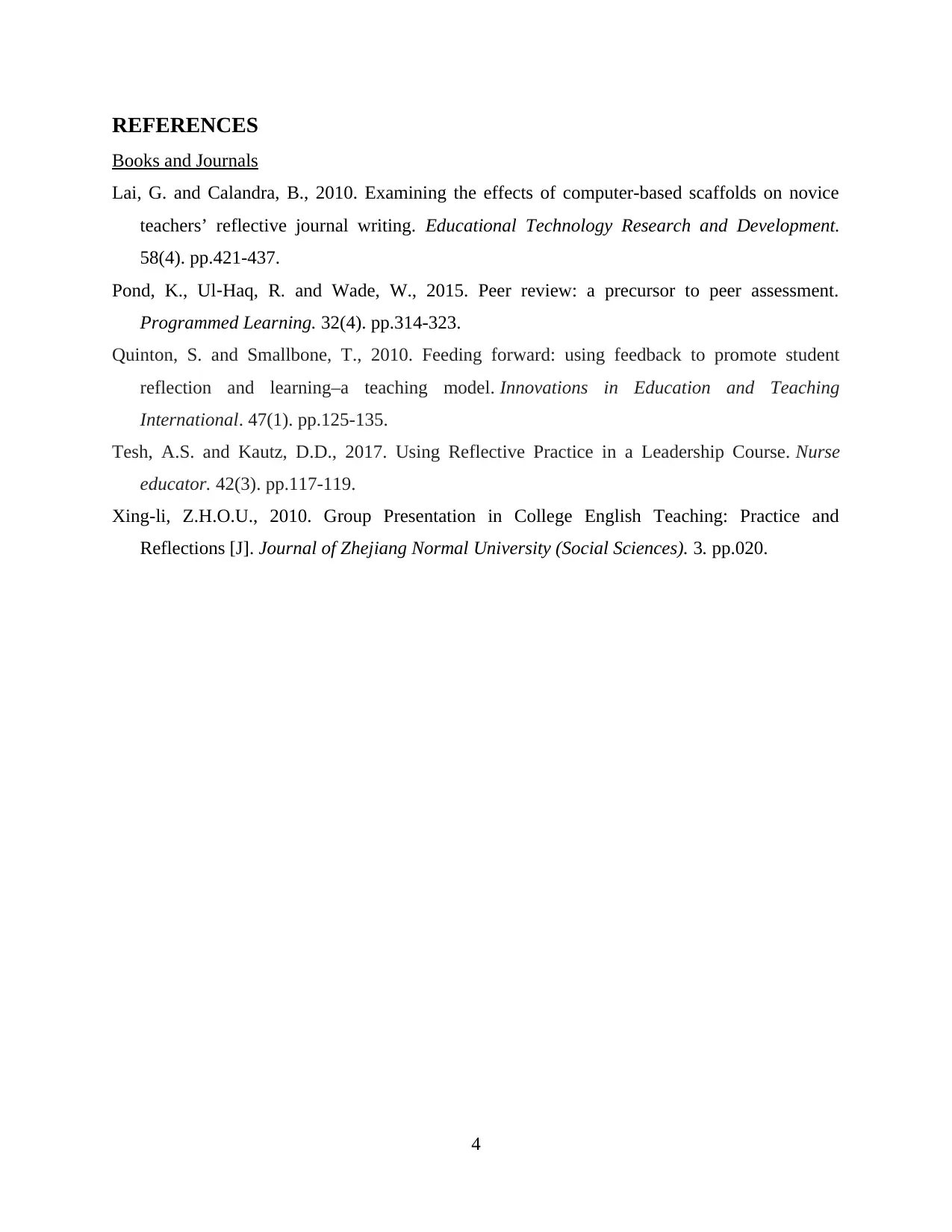
REFERENCES
Books and Journals
Lai, G. and Calandra, B., 2010. Examining the effects of computer-based scaffolds on novice
teachers’ reflective journal writing. Educational Technology Research and Development.
58(4). pp.421-437.
Pond, K., Ul‐Haq, R. and Wade, W., 2015. Peer review: a precursor to peer assessment.
Programmed Learning. 32(4). pp.314-323.
Quinton, S. and Smallbone, T., 2010. Feeding forward: using feedback to promote student
reflection and learning–a teaching model. Innovations in Education and Teaching
International. 47(1). pp.125-135.
Tesh, A.S. and Kautz, D.D., 2017. Using Reflective Practice in a Leadership Course. Nurse
educator. 42(3). pp.117-119.
Xing-li, Z.H.O.U., 2010. Group Presentation in College English Teaching: Practice and
Reflections [J]. Journal of Zhejiang Normal University (Social Sciences). 3. pp.020.
4
Books and Journals
Lai, G. and Calandra, B., 2010. Examining the effects of computer-based scaffolds on novice
teachers’ reflective journal writing. Educational Technology Research and Development.
58(4). pp.421-437.
Pond, K., Ul‐Haq, R. and Wade, W., 2015. Peer review: a precursor to peer assessment.
Programmed Learning. 32(4). pp.314-323.
Quinton, S. and Smallbone, T., 2010. Feeding forward: using feedback to promote student
reflection and learning–a teaching model. Innovations in Education and Teaching
International. 47(1). pp.125-135.
Tesh, A.S. and Kautz, D.D., 2017. Using Reflective Practice in a Leadership Course. Nurse
educator. 42(3). pp.117-119.
Xing-li, Z.H.O.U., 2010. Group Presentation in College English Teaching: Practice and
Reflections [J]. Journal of Zhejiang Normal University (Social Sciences). 3. pp.020.
4
⊘ This is a preview!⊘
Do you want full access?
Subscribe today to unlock all pages.

Trusted by 1+ million students worldwide
1 out of 6
Related Documents
Your All-in-One AI-Powered Toolkit for Academic Success.
+13062052269
info@desklib.com
Available 24*7 on WhatsApp / Email
![[object Object]](/_next/static/media/star-bottom.7253800d.svg)
Unlock your academic potential
Copyright © 2020–2026 A2Z Services. All Rights Reserved. Developed and managed by ZUCOL.





